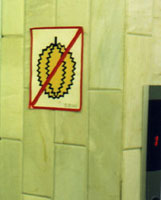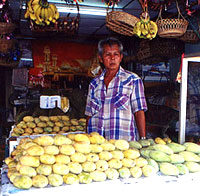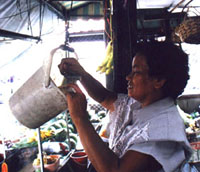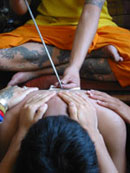Talking About Fruit
One thing most everyone loves about Thailand is the wealth of fresh and delicious fruit that is available all year round. I have had the luck to be exposed to many a new fruit since living here and am currently addicted to mango, pineapple and mangosteen. Asking other people what kind of fruit they like the best is a rather standard way of making conversation.
Many Thais want to know if I like durian, the strangest smelling of all fruits. Banned from busses, taxis, and even elevators, anyone who has tried durian will have a strong statement to make about its bizarre taste and smell. If given a choice, I would not eat it, but I also don’t go running away in fear when it is offered to me. Fruit makes for cheap snacking and it is always easy to find something you like. I recently headed down to one of my local stalls to get the scoop on fruit vending.
I talked to Somchai (63) about the business. He is married to Yusup (52) and they have seven children. Yusup and Somchai live in the back of their store with five other family members. Two of their children work at the store with their parents and the others work as fruit wholesalers at a gigantic local market.
live in the back of their store with five other family members. Two of their children work at the store with their parents and the others work as fruit wholesalers at a gigantic local market.
There are two small bedrooms, a large open cooking area, a bathroom and the storefront. Nothing fancy. The rent is 10,000 baht per month (222 US Dollars) and includes electricity. Because the family lives in the store they can easily keep long hours; 6am-7pm, seven days a week.
Somchai says they average about 1,500 baht per day profit, giving them 42,000 baht (933 US Dollars) per month. They spend one quarter of their income on food. Somchai stated, “we buy our food at the local market across the street. We cook for ourselves everyday and do not eat out.”
The store is piled high with fruit. Mangoes, rambutan, coconuts, bananas, durian, mandarin oranges, grapes, pineapples, coconuts, and watermelons provide a stunning array of colour. Prices range from 10-50 baht per kilogramme of fruit (0.22-1.11 US Dollars).
kilogramme of fruit (0.22-1.11 US Dollars).
Somchai operates on a 5-15 baht profit for every kilogramme of fruit he sells. He must turnover roughly 200 kilogrammes per day to make his average profit. He drives to the gigantic wholesale market with his pickup truck to fetch his merchandise. He says he does not buy from his children who work there. I didn’t ask why. Before launching his fruit stall five years ago, Somchai and his wife used to drive with their pickup truck to different factories during the day to sell fruit to the employees.
I asked Somchai if he ever shops at the French-owned mega-store ‘Big-C’ that is up the street from his store. He stated, “I buy milk, shampoo, laundry detergent, and other things for cleaning there.” A curious customer who had been listening to us chat chimed in, “I like to buy my fruit here. They are friendly to all the customers. They are cheaper than the big stores, and I can bargain with them.” She bought enough fruit to feed a small army and took off.
small army and took off.
As I looked around his store, I noticed two things: gigantic pictures of Mecca and sheets of winning lottery numbers posted on the wall. Somchai said, “I am Muslim, but I am not from southern Thailand. I am from Ayuthaya (one hour north of Bangkok). My wife is the one who likes to play the lottery. I don’t like it, but I would like to win that big money.”
Somchai is a good host. He brings me a Coca Cola and tries to convince me to eat some pineapple. As I took photographs he became disappointed. “You should come back at 4 p.m. We will have a big fruit delivery. Then you can see the big piles of beautiful fruit. Right now we don’t have very much,” he insisted. I did in fact pass Somchai’s store that evening at 6 p.m. The fruit piles had tripled in size.
After I finished talking to Somchai, I went to Big-C to compare prices. I learned that pineapple, watermelon, and coconut were all good values. Nevertheless, Somchai’s shop averages out to be fifty-four percent cheaper if one were to purchase seven pieces of fruit. In addition, ‘Big-C’ sometimes uses Styrofoam padding around their fruit, causing waste and additional weight on your bill.
I have learned that my small neighbourhood shops can provide most everything I need. I prefer shopping this way. It keeps me out of neon lighting and artic air-conditioning. I know where my money is going. On top of that, seven times out of ten it is cheaper.
I hope that local stalls like Somchai’s can hold their own against the impending crush of the super convenient mega-stores springing up all over the place. The personal touch, the atmosphere, the bargaining ability and the fact that you often get to see the owner’s family milling about keeps people wanting to return to these roadside venues. Somchai is my number one fruit vendor from here on out.
What I liked best about Somchai’s shop was the cash register: a plastic bucket held up against the ceiling by a pulley system weighted with a rock. This is something a mega-store could simply never compete with.
